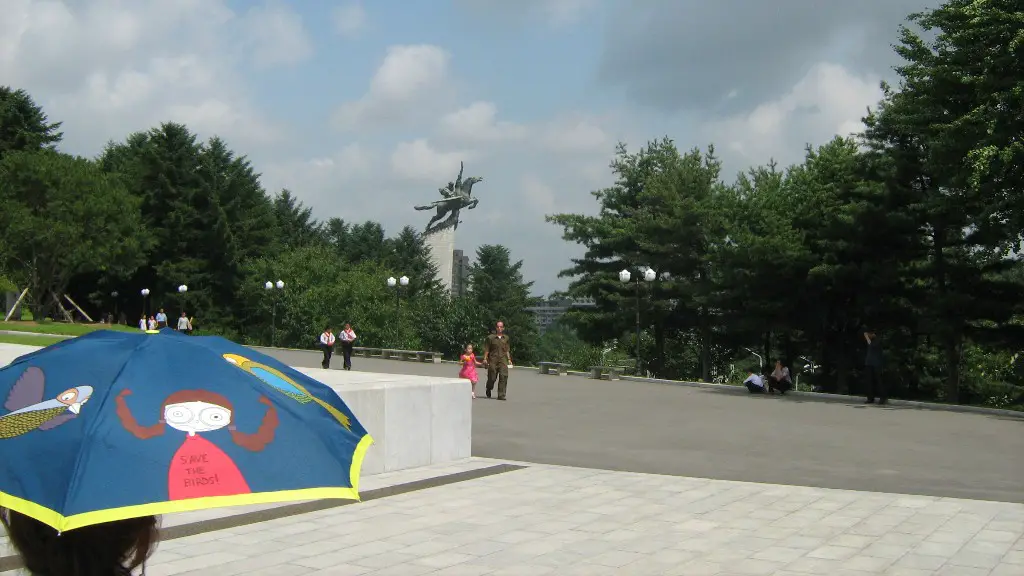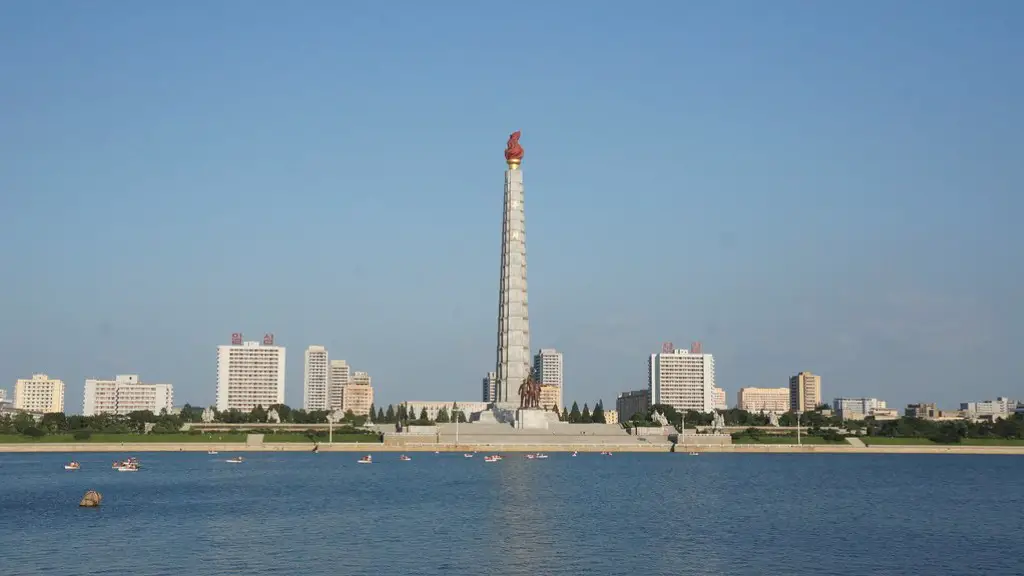As tension continues to mount between North Korea and the US, the question of whether or not the US should launch a nuclear strike against North Korea has become an increasingly popular topic of discussion among global policy makers, politicians, and scholars. It is an extremely difficult decision to make, and everyone has their own opinion on the matter. Many believe that the US should not launch a nuclear strike against North Korea, while others believe that preemptive action is the only way to bring about peace and security. It is important to understand the geopolitical history between the two countries, and to consider the potential consequences of a nuclear strike before making a final decision.
First and foremost, it is important to understand the complex history between the United States and North Korea. The two countries have fought a Cold War conflict that had very little direct engagement. The US has used economic sanctions and embargos in an attempt to cripple the North Korean economy and has also promoted human rights campaigns to try and decrease human suffering within the country. North Korea has responded in kind, launching several missile tests in the past few years in an effort to demonstrate its capabilities and the potential consequences of US aggression.
In addition to the history between the US and North Korea, it is also important to consider the potential ramifications of a nuclear strike. Such an action could have disastrous consequences for the country and the region, including a devastating humanitarian crisis. The US would also be forced to contend with the possibility of nuclear fallout and radioactive contamination, which could have long-term effects on the environment and human health. It is also important to consider the risk of a nuclear war, since North Korea could respond with devastating force if the US were to launch a nuclear strike.
From a political perspective, launching a nuclear strike against North Korea could also have grave repercussions. It is likely to further alienate the US from the global community, and could also increase the likelihood of other states developing their own nuclear weapons in order to defend themselves against US aggression. It is possible that the US would be viewed as an aggressor, and that other countries might be unwilling to collaborate with the US on any future international initiatives.
The US must carefully consider all the potential consequences of launching a nuclear strike against North Korea before making a decision. It is important to remember that the decision should not be taken lightly, as it could have dire implications for the region and the world. It is therefore essential that the US weighs the risks and opportunities very carefully before making a decision.
The Economy and Environment
The economy and the environment are two areas that would be drastically impacted by a US nuclear strike against North Korea. Economically, the cost of launching a nuclear strike could prove to be too much, especially with North Korea’s already fragile economy. In addition to the immediate economic strain created by destructive fallout, the US would also bear the cost of any clean up efforts, which could be extremely costly. The environmental implications of a nuclear strike would also be very concerning, as radiation could travel far and wide, causing substantial damage to ecosystems, plants, and animals.
The US is already struggling with pollution and global climate change, and a nuclear strike would only further exacerbate the situation. Nuclear weapons produce radioactive material and nuclear byproducts, which can be dangerous to both people and the environment. In addition, the radiation from a nuclear strike could cause long-term air, water, and land contamination, making it difficult for ecosystems to recover. In light of these potential consequences, it is crucial for the US to carefully consider the economic and environmental implications of a nuclear strike before making a decision.
It is also important to consider the effect of a nuclear strike on North Korea’s population. More than 25 million people are currently living in North Korea, and many of them could be killed or injured in a nuclear attack. A nuclear strike would also create a massive refugee crisis in the region, as millions of North Koreans would likely attempt to flee their ravaged homes. The US must weigh the human cost of a nuclear strike before making a final decision.
In sum, it is clear that a nuclear strike against North Korea would be an extremely risky and devastating move. The US must carefully consider all potential consequences before making a decision, including the potential economic, environmental, and human cost of an attack. It is essential that the US weighs the risks and opportunities very carefully before launching such a strike.
International Repercussions
In addition to the economic, environmental, and human costs of a nuclear strike, it is also important to consider the potential ramifications from an international perspective. It is highly likely that the US would face severe criticism from the global community for launching a nuclear attack against North Korea, and that other states may retaliate with economic sanctions or a boycott. The US would also likely face backlash from the United Nations, and the Security Council may take action to limit any future US aggression.
It is also possible that other states may attempt to develop their own nuclear capabilities in an effort to deter any US aggression in the future. This could lead to a global arms race that could have devastating consequences for international peace and security. Many countries around the world rely heavily on the US for security and defense, and a US nuclear strike could cause other states to shift their own strategies and to become less reliant on the US.
In light of these potential repercussions, the US must carefully consider the implications of a nuclear strike before making a decision. It is essential that the US takes into consideration how other states may respond before proceeding with any military action, as it could potentially destabilize the region and lead to further conflicts. It is therefore essential that the US weighs the risks and opportunities very carefully before deciding to launch a nuclear attack.
Public Opinion
Public opinion is also an important factor that must be taken into account when deciding whether or not to launch a nuclear strike against North Korea. Opinion polls conducted in the US show that a majority of Americans are opposed to a nuclear attack, with 69% of respondents expressing that they do not support such a strike. Public opinion in other countries is also largely opposed to US military action, with an overwhelming majority of respondents in countries such as China, South Korea, and the UK stating that they do not support a pre-emptive strike against North Korea.
The public’s opinion of a nuclear strike is likely to have political consequences in the US, as there is widespread distrust of the current administration due to their adversarial approach to foreign policy. This may make it difficult for the President and his administration to garner public support for a pre-emptive strike against North Korea, as the majority of Americans do not believe that such an action is an appropriate solution. It is essential that the US takes into consideration the public’s opinion on a nuclear strike before making a decision.
Additionally, the US must consider the impact of publicity and media coverage when deciding whether or not to launch a nuclear strike. Depending on how the media portrays the US, it is possible that the public opinion of a nuclear attack could drastically change, as the public may become less supportive of such an action if it is cast in a negative light. It is therefore essential that the US takes into consideration the potential implications of media and public opinion before making a decision to launch a nuclear strike.
Potential Impact on Relationships
The potential impact of a nuclear strike on US relationships with other countries must also be taken into account. A nuclear strike would likely have a negative effect on the US relationship with countries that are close allies, such as South Korea, Japan, and other states in the region. This could have a long-term effect on the US relationship with these states, as many allies may be unwilling to cooperate with the US if it launches a nuclear attack.
Additionally, a nuclear strike could have a damaging effect on the US relationship with North Korea, as North Korea has already shown its willingness to respond with military force. This could result in an escalation of tensions between the two countries, and could potentially lead to all-out war. The US must carefully consider the potential consequences of a nuclear strike on its relationship with North Korea before making a decision.
Finally, a US nuclear strike could cause other countries to rethink their relationship with the US. Many countries rely heavily on US aid and assistance, and if the US launches a nuclear strike, these countries may choose to distance themselves from the US and to look for assistance elsewhere. This could have a long-term impact on the US’s foreign policy objectives, and could potentially lead to a weakening of US influence in the region.
In conclusion, there are a variety of factors that the US must take into consideration when deciding whether or not to launch a nuclear strike against North Korea. The US must consider the potential economic, environmental, human, and political implications of such an attack, not to mention the potential repercussions from the international community and the public. It is essential that the US weighs the risks and opportunities very carefully before making a final decision.




